Digital inclusion in action
Digital inclusion in action
Four South African training institutions boost youth employment
Rural life in South Africa’s Western Cape is quiet and dynamic. Surrounded by lush landscapes along the coast, the locals live in close-knit communities where they speak a variety of local languages and maintain rich cultural traditions. Somewhere in this diversity, a woman is on the move.
She is visiting a rural township at the invitation of her friend. She walks around the community, taking in its sights and sounds and talking to some of the young people she meets. They are fun and funny, bustling with energy and hopes for the future. Yet, many lack the training and skills to access jobs in the country.
As a multidisciplinary media specialist, she engages them on what she knows best: the media. She asks them about social media, content creation, film, and television. She is surprised by their lack of knowledge about digital media and the opportunities available. She returns home and with two other women creates a programme that specifically targets rural youth and equips them with the knowledge and skills they need to take advantage of opportunities in the media space. This programme later became one of the catalysts to advance digital inclusion in the country. Read on to follow this journey.
The young people she met in the rural township are not a rarity. They are part of the 8 million South African youth who are Not in Employment, Education, or Training (NEET). The situation is dire as one in three South Africans is a youth, with 67% of these youth being unemployed. The problem is further worsened by a low labour absorption rate and a huge lack of employment opportunities. Where these opportunities exist, a vast population of young people need to gain the requisite skills to claim them.
With more jobs relying on the use of digital technology, the current demand for digital skills outweighs the available supply. This is a consequence of the Fourth Industrial Revolution. The Revolution, underway since 2016, is widening global inequality and significantly changing the world of work. These changes were further accelerated by the COVID-19 pandemic, worsening displacement and disrupting service delivery as we know it. By 2030, it is estimated that 3.3 million existing jobs will be displaced. Trends like this have placed digital skills acquisition at the centre of the required transformation for many economies worldwide.
1. Stats SA, Quarterly Labour Force Survey. Quarter 4: 2020, 2021; data from Department of Higher Education and
Training (DHET), February 2021
2. Nomfanelo Magwentshu, Agesan Rajagopaul, Michael Chui, and Alok Singh, The Future of Work in South Africa (McKinsey
and Company 2019).
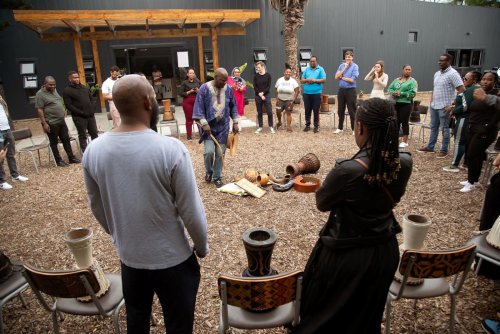
Chapters
Closing the digital divide
By 2030, the Fourth Industrial Revolution is predicted to create 230 million digital jobs in Africa. As a result, it is imperative to prepare Africa’s youth to operate, participate, and compete in the digital economy. A key part of this preparation involves skills-based education — the equipping and upskilling of youth to improve their prospects in the South African labour market.
In 2022, sponsored by the Government of Flanders, the Joint Programme Partnership and Deutsche Gesellschaft für Internationale Zusammenarbeit (GIZ) launched the Digital Skills for Decent Jobs for Youth to strengthen the digital ecosystem and decrease the digital divide in South Africa. The project was designed as a specific contribution to implementing South Africa’s National Digital and Future Skills Strategy (2021–2025).
The Joint Programme Partnership consists of the Department of Communications and Digital Technologies (DCDT), the International Labour Organization (ILO), the International Telecommunication Union (ITU), and the United Nations Development Programme (UNDP).
“We joined the Partnership to magnify what the ILO had already started to do with the Decent Job for Youth Programme and to tie it to digital skills development. Before joining the partnership, we had published an implementation guide for our National Digital and Future Skills Strategy. The UN agencies approached us offering to help implement some elements of our digital skills strategy. They also came on board with the expertise needed to achieve the objectives of the programme in the country.” – Nozipho Sihlahla, Senior Manager, DCD
The project had two main outcomes. The first was to improve the capacity of training institutions to digitize their training, and the second was to increase the pre-entry level digital skills of youth NEET who generally are poor, rural, and belong to low-income families. As a result of the project, youth NEET will have improved access to education, training, and labour market opportunities.
Before the project was launched, 4,397 youth NEET were interviewed about their perception of the digital economy and what they feel they need to participate in it fully. In parallel, a survey was conducted among 834 businesses to understand their skills needs. Through this research, the ILO understood the in-demand digital roles and the available opportunities for training and upskilling.
The project chose to focus on rural youth, with particular attention to women and young persons with disabilities, as they face more difficulty in competing for employment and accessing decent jobs.
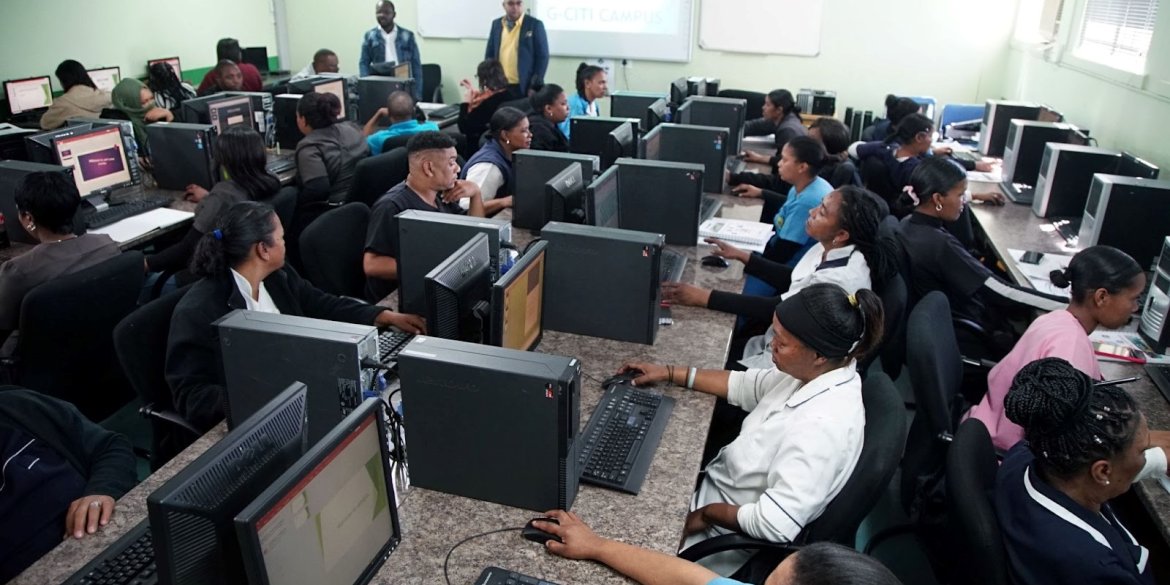
Supporting innovative solutions
In July 2022, the ILO launched the South Africa Skills Innovation Challenge. It was a call for innovative ideas that could contribute to creating more employable youth armed with in-demand digital skills. By building capacity at the institutional level, youth NEET in the provinces where these institutions are based become beneficiaries of the improved digital skills courses offered.
Selected winners would get financial and technical support and access to a six-month programme to assist with prototyping and piloting their solutions. Applications closed in September 2022.
“We didn’t want to look at innovation from a one-dimensional perspective so we settled on an approach that would involve as many stakeholders as possible. We were seeking people focused on digital skills acquisition who have demonstrated an ability to grow and make change in their communities. They also had to work on youth development initiatives that facilitated rural contributions towards the development of the nation.” – Nozipho Sihlahla, Senior Manager, DCD
The call yielded 14 eligible proposals that were reduced to 9 finalists through a series of technical assessments. The finalists were invited to pitch before an external panel consisting of skill experts, digital specialists, and youth development institutions. In November 2022, 4 winners and 5 runners-up were announced at the DCDT & GIZ Digital and Future Skills National Conference.
The winning institutions were iKasi Creative run by Lamise Inglis and her partners, Limpopo-based Digital Vexospark founded by William Makgaba, Lindamahle Innovation Centre managed by Zine Nkukwana, and Genesis Community IT based in Cape Town and founded by Llewellyn Scholtz. To further strengthen the Technical and Vocational Education and Training (TVET) ecosystem in South Africa, selected runners-up were exposed to training and networking activities relating to the digital economy.
The winners went through a virtual Innovation Bootcamp in April 2023 where they brainstormed, refined their ideas, and connected to build collective intelligence to support the acquisition of digital skills in South Africa.
“The four winning institutions are at different phases in their organisational life cycle. Some are still relatively new to the digital skills environment whereas others have extensive knowledge and experience in the field. The institutions have the capacity to help one another based on their previous experience and expertise.” - Kim Baldry, Project Mentor
The Bootcamp helped the four institutions to ideate their project design elements, map the stakeholders involved, and focus on data-driven decision-making. They also learned practical tools to guide design and manage the learning experience for their students, and virtual reality applications in the development sector. The Bootcamp was highly experiential, focusing on group discussions, project work, and mentoring.
At the end of the Bootcamp, project prototypes had been developed, prototyped, and tested. Project plans were then concretized and offered services connected with digital skills development and the overall innovation ecosystem in which they functioned. Lastly, with a focus on creating sufficient outreach and impact, prototypes were finalised and ready for upscaling.
Three months after the Innovation Bootcamp, winners and runner-ups from Digify Africa and the Africa Women Innovation and Entrepreneurship Forum (AWIEF) were invited to the ITCILO Campus for a Digital Innovation Lab in July 2023 designed to spark inspiration and provide guidance for successful training digitization and innovation.
At the Lab, their project proposals received technical advice and were validated. This involved an overall review of the innovation cycle and moving draft projects from an exclusive focus on digital skills to a double focus on innovation and inclusion. Amongst a myriad of topics, participants learned about learning and innovation trends, innovations in communicating development, virtual and augmented reality, and podcasting
Imagem
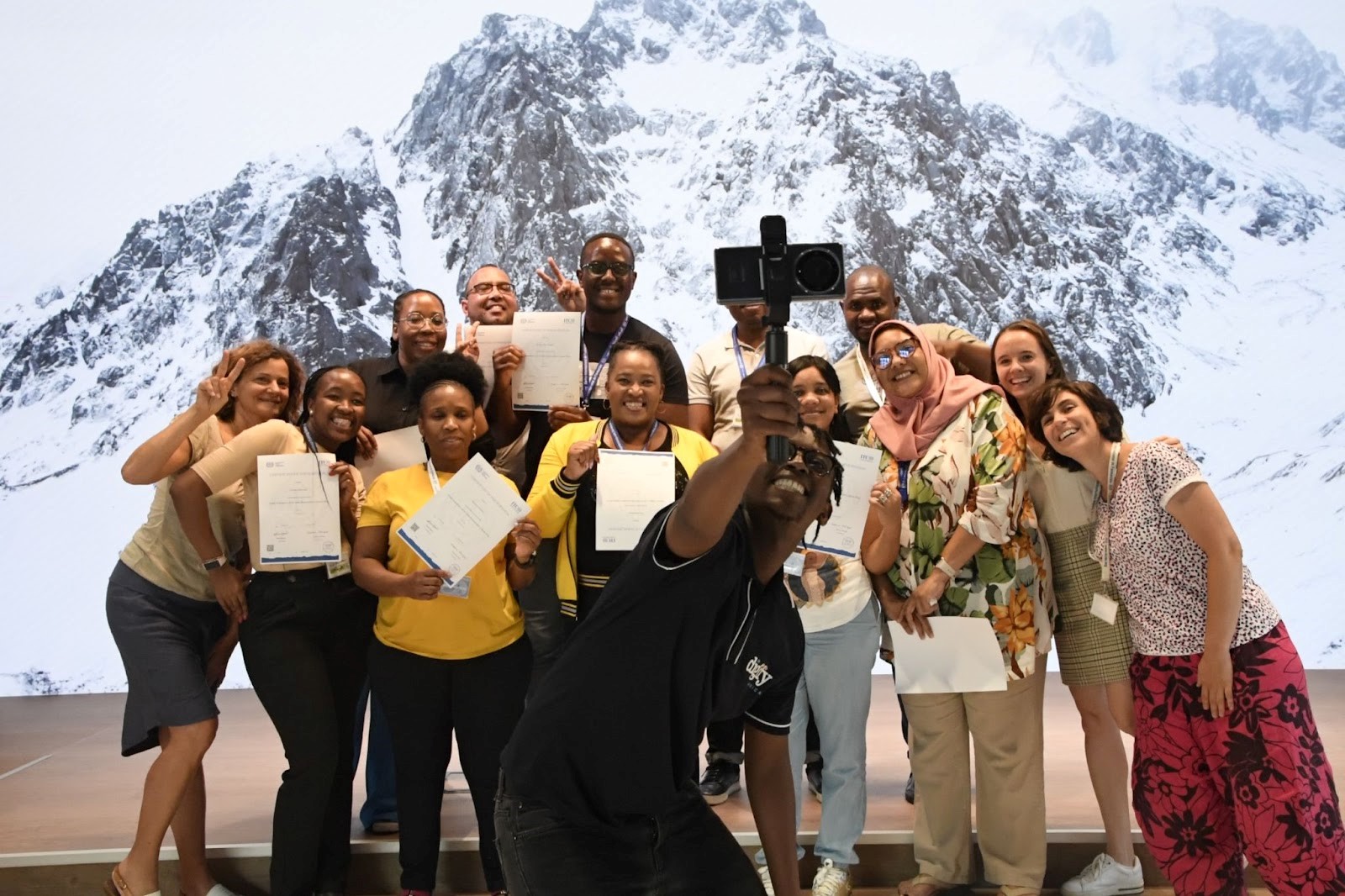
Platforming young voices
Remember the woman on the move visiting the rural township? Well, meet Lamise Inglis. Lamise is on a mission to empower rural youth through digital media skills training. Her work equips youth to find their voice and share their stories with the world.
Lamise believes that by sharing and telling the stories of these communities through digital media, she supports positive change in the individuals she trains, and this, in turn, drives social transformation in rural communities. To actualize this, iKasi Creative reaches out with Digital Media Content Creator programmes, sparking the creative economy in rural areas and bringing relevant skills to previously disadvantaged youth.
iKasi Creative won the Skills Innovation Challenge with their solution “Digital Media Skills Training” aimed at women and girls in the rural areas of the Western Cape.
Her solution involved reaching out to women and girls in marginalized communities, training them, and giving them access to the digital industry. It further created a network linking youth to industry opportunities. Beneficiaries were also supported to go into further training or employment and to create opportunities in the rural areas they come from.
“The trip to the ITCILO Campus in Italy was interesting. I enjoyed communicating with the facilitators and being at the campus was great. I also enjoyed connecting with the other organizations at the table. The training in Italy spoke about the concept of lifelong learning and slow learning and that’s something we can implement in the way we train at iKasi.” – Lamise Inglis, Managing Director, iKasi Creative
Making a stand against rural poverty
In 2006, William Makgaba dropped out of the University of South Africa because he could not use Microsoft Word. He had been given an assignment and could not navigate the software. He then realized that this would be the fate of many others from rural villages like his. They would get into university or a similar situation and be unable to catch up.
This spurred him to start Digital Vexospark. Based in Limpopo, Vexospark provides computer training and computer solutions to rural youth. At Vexospark, William Makgaba teaches courses on coding and robotics, cyber security, digital literacy, programming, digital entrepreneurship, and Cisco courses like IT essentials, Artificial Intelligence, and the Internet of Things.
The ILO supported him in piloting his training initiative: “Digital Touch in Rural Communities”. As one of the winners of the Innovation Challenge, Williams got to participate in the Digital Innovation Lab where he says he learned to look at his solution with more thorough eyes. William’s initiative was implemented in the rural areas of Limpopo, Mpumalanga, Eastern Cape, North West, and Northern Cape.
"Being a part of the Learning Innovation Bootcamp exposed me to several teaching methods. I also learned how to better align my programmes to my goals." – William Makgaba, Director, Digital Vexospark
Leaving no one behind
Lindamahle Innovation Centre prides itself on intentionally arming women and marginalized youth with the skills they need to take part in the digital economy. Led by Zine Nkukwana, the Innovation Centre strives to equip young Africans with the skills that the 4th Industrial Revolution has to offer.
The Lindamahle Innovation Centre was awarded to work with communities in the OR Tambo District on “Training of NEET Youth on ICT & Cisco Networking Skills”.
Zine was particular about including women and young wives in her training. Her recruits were divided into two streams: Network Maintenance and Community Capacitation. Network Maintenance is focused on coding, programming, and cybersecurity. Community Capacitation is focused on community development and entrepreneurship.
Zine says that she was given a new way to see at the Digital Innovation Lab. Her mind was expanded and her knowledge was clarified and enhanced. Upon her return to South Africa, she began to emulate all she had learned.
“Something shifted in me from my experience at Turin. How I look at things; it’s different from how I did before Turin. I’m also training my facilitators to streamline their thinking processes. I’m trying to get them to work smart because I’m working smarter than I was before.” – Zine Nkukwana, CEO, Lindamahle Management Systems
Digital skills for more than a few
With over a thousand visits to his facility, Llewellyn Scholtz's successes show his understanding of the intersectionality of the problem. His work with the Genesis Community IT Initiative is mainly focused on igniting the entrepreneurial spirit in young people and improving youth’s access to technology. Recognizing that digital exclusion and the digital divide are growing, he found a problem and created a solution.
Llewellyn called his idea “Mobile Tech Champions”. With it, he aimed to create potential employment opportunities, inspire entrepreneurship, and stimulate economic growth in townships and local communities. Recognizing that women and girls are disproportionately marginalized in tech spaces, he planned to equip 60% female and 40% male youth in Elsies River and its environs with mobile literacy and mobile phone repair skills.
When Llewellyn came back to South Africa, he added podcasts to his program because he had learned about podcasts and how to use them back in Turin.
“I saw a lot of innovations in Turin. As a result, I was able to take a backseat and look at my program differently. Turin allowed me to reflect and see the value in myself as a person, where I am, and where I need to be.” – Llewellyn Scholtz, Executive Director, Genesis Community IT Initiative
Positioning for the future of work
While the project has made significant progress, there's still more to be done in South Africa. To maintain the current unemployment rates till 2050, South Africa needs to create 7.1 million jobs. To keep the entire working population engaged in decent work, South Africa has to create 29.5 million additional jobs by 2050. This is no small task.
Fully acknowledging these realities, the partnership is committed to preparing South African training institutions to train other trainers and transfer their learnings to other institutions. This will ensure the replication of the project's results across the region and cement the adoption and sustainability of the project's initiatives.
From 30th October to 2nd November 2023, the four institutions and other runner-up training institutions engaged in a Training of Trainers and Networking Experience in Cape Town, South Africa aimed at supporting training providers to develop the digital skills of Youth NEET. The event was organised by the ITCILO and the ILO Pretoria Office.
Participants acquired knowledge about learning and development trends, innovative learning techniques, design concepts, user journeys, and labour market pathways. They showcased their success stories, exchanged ideas, and met development partners like the National Management Pathway Network, GIZ, Pantopicon, and d-teach.
“By joining the National Pathway Management Network, training institutions can help beneficiaries even further. The network's resources help young people overcome challenges such as high data costs, lack of access to personalised advice, insufficient workplace experience or skill profiles that need to be aligned with the job market.” - Moipone Kgatle, Project Monitoring and Evaluation Officer, ILO Pretoria Office
The event also featured a study visit to Bridges for Music, an organization focused on well-being, creative entrepreneurship, and the creation of safe spaces and holistic learning programmes to enhance the creative potential of youth in the Langa township. There, participants engaged in an indigenous instruments workshop to witness the crossover of drumming and training.
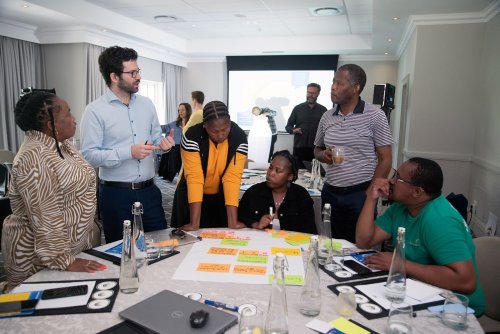
So far, the project has enhanced the digital skills of 40 trainers and 174 young people are projected to benefit from the programmes implemented by the training institutions. The outcomes and impacts will be evaluated and consolidated as the project winds to a close.
The ILO Pretoria Office will sustain the connections we initiated and those the institutions have established themselves. This will be achieved through the establishment of a Community of Practice dedicated to discussing challenges and solutions related to digital and future skills.
At the end of the project in March 2024, the responsibilities will remain with the training institutions and their trainers. Since the digital skills curricula and technological infrastructure are already in place, the trainers will smoothly transition into an autonomous teaching model.
“We are hopeful that as the Innovation Challenge concludes we can use this experience as a model to build on and replicate in other interventions. We would also like to see more partnerships established so these institutions can be connected to partners who can help them build on what they have started. We are also happy to recommend these institutions based on the expertise and experiences they have acquired in the course of the project.” – Nozipho Sihlahla, Senior Manager, DCDT
That initial walk through the South African township not only ignited the desire to advance digital inclusion in individuals like Lamise, William, Zine, and Llewellyn but also blossomed into decent employment opportunities for South African youth. May this inclusive and innovative journey be just the start.
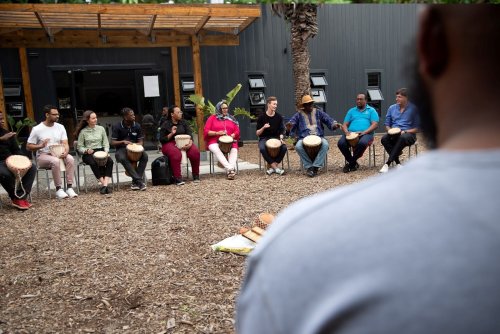
Discover the project







